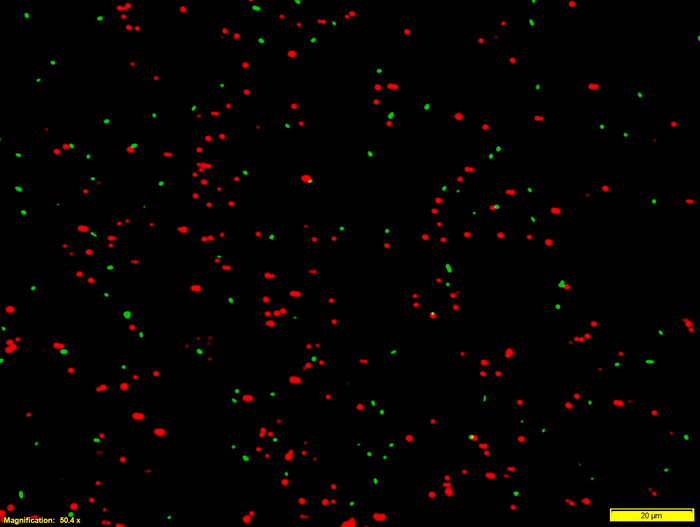FORT LAUDERDALE/DAVIE, Fla. – “Know thy self; know thy enemy” – Sun Tzu

Credit: Nova Southeastern University
FORT LAUDERDALE/DAVIE, Fla. – “Know thy self; know thy enemy” – Sun Tzu
That quote is from centuries ago, but it is applicable in so many ways. One example – new research from Nova Southeastern University (NSU) is understanding human infections and unlocking how bacteria “work together” making these infections much more difficult to treat. But it is understanding this symbiotic relationship – knowing thy enemy – that can lead to better ways to treat various ailments.
This new study was recently published by the scientific journal eLife, and can be found ONLINE.
“There are good bacteria and not so good bacteria,” said Robert Smith, Ph.D., and Associate Professor and Research Scientist, Cell Therapy Institute in NSU’s Kiran Patel College of Allopathic Medicine (NSU MD). “Bacteria are all around us, with some providing beneficial aspects to life, but there are others that cause infections or worsen illnesses.”
Smith was the Principal Investigator on a research team that looked at how bacteria may work together, exacerbating illness and making treatment more difficult. Specifically, they looked at two bacteria that are commonly found together in infections – Staphylococcus aureus and Pseudomonas aeruginosa. Staph can be found on the skin of around 50% of the population; Pseudomonas can be found in the soil. However, when they get together in infections, things can get bad.
“Most infections are caused by a single bacterium, but when bacterial species ‘gang up’, they can become even more challenging to treat,” Smith said. “The infection is more severe, and they can resist antibiotic treatment.
According to Smith, these bacteria communicate in the wound, causing the infection to be more severe and challenging to treat. This is particularly important in individuals with cystic fibrosis where these two bacteria thrive.
“Towards trying to develop new ways to treat infection with these bacteria, we found that how fast each bacteria grows and how much energy each bacteria has determines how they talk to each other in the wound,” Smith said. “If we can interrupt their ability to talk to each other, then we might be able to come up with ways to change their growth or the amount of energy they possess, which could decrease the severity of the infection and may make them more susceptible to antibiotics.”
Smith said there is much more research to be done, but every discovery is a step toward improving the overall human condition.
Research was sponsored by the Army Research Office, a directorate of the U.S. Army Combat Capabilities Development Command Army Research Laboratory, and was accomplished under Grant Number W911NF-18-1-0443. The views and conclusions contained in this document are those of the authors and should not be interpreted as representing the official policies, either expressed or implied, of the Army Research Office or the U.S. Government. The U.S. Government is authorized to reproduce and distribute reprints for Government purposes notwithstanding any copyright notation herein.
Be sure to sign up for NSU’s RSS feed so you don’t miss any of our news releases, guest editorials and other announcements. Please sign up HERE. You can also follow us on Twitter @NSUNews.
###
About Nova Southeastern University (NSU): At NSU, students don’t just get an education, they get the competitive edge they need for real careers, real contributions and real life. A dynamic, private research university, NSU is providing high-quality educational and research programs at the undergraduate, graduate, and professional degree levels. Established in 1964, the university includes 14 colleges, the “theme park” for start-ups, scale-ups , and entrepreneurs, the Alan B. Levan | NSU Broward Center of Innovation, the 215,000-square-foot Center for Collaborative Research, the private PK1-12 grade University School, the world-class NSU Art Museum Fort Lauderdale, and the Alvin Sherman Library, Research and Information Technology Center, one of Florida’s largest public libraries. NSU students learn at our campuses in Fort Lauderdale, Fort Myers, Jacksonville, Miami, Miramar, Orlando, Palm Beach, and Tampa, Florida, as well as San Juan, Puerto Rico, and online globally. With more than 200,000 alumni across the globe, the reach of the NSU community is worldwide. Classified as having “high research activity” by the Carnegie Foundation for the Advancement of Teaching, NSU is one of only 59 universities nationwide to also be awarded Carnegie’s Community Engagement Classification, and is also the largest private institution in the United States that meets the U.S. Department of Education’s criteria as a Hispanic-serving Institution. Please visit www.nova.edu for more information.
Journal
eLife




